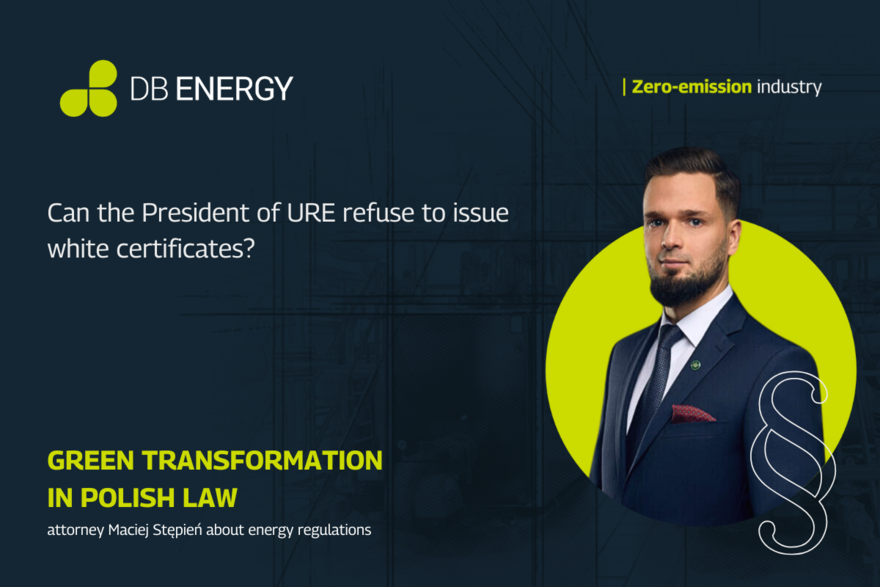Can the President of URE refuse to issue white certificates?
Entrepreneurs planning investments to improve energy efficiency often wonder whether, despite their implementation, the President of the Energy Regulatory Office may refuse to issue energy efficiency certificates (so-called "white certificates"). In other words, when investing, often considerable amounts in a given energy-saving project, does the entrepreneur have a guarantee of obtaining white certificates, which they will then be able to sell on the Polish Power Exchange? These concerns are justified because, unfortunately, in practice, there may be situations in which the President of the Energy Regulatory Office refuses to grant white certificates.

Article 22 of the Energy Efficiency Act states that the President of the Energy Regulatory Office shall issue an energy efficiency certificate. The use of the phrase "the President of the Energy Regulatory Office shall issue" could, therefore, suggest that the President is bound by law to issue white certificates in accordance with the submitted application. However, the Act does not state that the President "may issue" or "consider the application" – which could suggest that the decision may be negative. Nonetheless, the practice of the Energy Regulatory Office shows that decisions may indeed be negative.
When will the President of the Energy Efficiency Office refuse to grant White Certificates?
According to the applicable law, the provisions of the Code of Administrative Procedure – on the issuance of certificates – apply accordingly to the issuance of energy efficiency certificates. Therefore, if the application for an energy efficiency certificate is incorrect, for example, if the necessary data or documents are missing, the authority should, before issuing a negative decision, call on the applicant to supplement the formal deficiencies of the application. Only failure to supplement the application within the specified deadline or incorrect supplementation may result in the issuance of a negative decision or leaving the application without consideration.
Absolute reasons for refusing to issue energy efficiency certificates are specified in Article 20, paragraph 2 of the Energy Efficiency Act, primarily exceeding the permissible amount of public aid for a given undertaking as a result of obtaining a thermal modernization bonus or investment aid for a given investment. White certificates will also not be granted for undertakings that are too small, resulting in energy savings or total energy savings of less than 10 tons of equivalent oil on average per year.
A common reason for refusing to issue white certificates (or their approval after conducting a post-implementation audit) is also the commencement of work aimed at implementing an undertaking aimed at improving energy efficiency before the date of submission of the application for an energy efficiency certificate. The so-called "incentive effect" is important in this respect, i.e. the fact that energy efficiency certificates are issued for entities planning to commence work aimed at implementing an undertaking aimed at improving energy efficiency, and not for entities currently implementing the investment or, even more so, for entities that have completed it. The dates of ordering equipment and concluding implementation agreements will be important in this respect.
There may also be a situation in which a given investment is not included in the list of projects aimed at improving energy efficiency announced in the Announcement of the Minister of Climate and Environment of 30 November 2021 or the investor is mistaken as to whether a given investment meets the conditions for qualifying it as a project aimed at improving energy efficiency.
Other cases of issuing negative decisions may be reasons concerning the quality of the energy efficiency audit and the auditor himself. The President of the Energy Regulatory Office may determine that the audit attached to the application does not meet the requirements of the regulation of the Minister of Energy or the audit was performed by an entity that does not meet the statutory requirements regarding professional experience or education. Procedural issues in the assessment of the evidence collected and those concerning the interpretation of substantive law may also be significant.
What to do after a refusal to grant White Certificates?
A refusal to issue white certificates is not a final decision closing the way to granting certificates. The issuance by the President of the Energy Regulatory Office of a decision refusing to issue white certificates does not definitively close the possibility of obtaining certificates, because an unfavourable decision of the President of the Energy Regulatory Office may be appealed to the District Court in Warsaw - the court of competition and consumer protection, which must be filed within 7 days of the date of delivery of the decision. Moreover, even in the event of an unfavourable decision of the court of first instance, it can be subject to review by the Court of Appeal in Warsaw. In practice, this means that the application for issuing white certificates can be examined by three independent entities, including two separate panels of judges. Regardless of the described legal possibilities of verifying the decision of the President of the Energy Regulatory Office, I strongly recommend that investors start cooperation at the earliest possible stage with a professional entity providing services in the field of obtaining, selling and settling white certificates in order to avoid the need to verify unfavourable decisions in court.